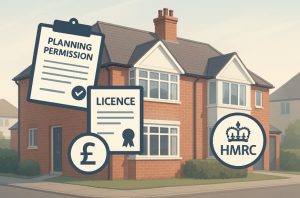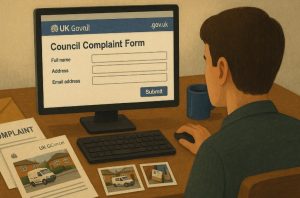The UK is witnessing a notable shift in how and where people conduct their professional activities. A growing number of entrepreneurs are setting up businesses in their homes, thanks to technological advances, cost savings, and flexible work culture. In fact, there are now nearly 3 million home-based businesses across the country.
While many of these businesses operate within legal and social norms, others may unintentionally or deliberately cross boundaries causing disruption to neighbours and violating local regulations. In such instances, it becomes necessary to understand how to report a neighbour running a business from home in the UK.
This comprehensive guide will explore how to identify unlawful home businesses, the legal framework that governs them, how and when to take action, and what to expect once a complaint is filed.
What Legal Framework Governs Home-Based Businesses?

Running a business from a residential property is legal in the UK, but it comes with specific legal and regulatory requirements that must be met to ensure minimal impact on neighbours and the local environment.
Unlike commercial premises, residential properties are not typically designed to accommodate increased traffic, signage, or client interactions. Therefore, certain thresholds such as changes in the use of the property, environmental impact, and infrastructure modification that trigger legal oversight.
Legal Factors Business Owners Must Consider:
- Planning Permission: If the business significantly changes how the home is used (e.g., becomes a client-facing operation), local planning consent may be required.
- Business Rates: If any part of the home is used solely for business such as a converted garage or external office, it could become liable for business rates, subject to assessment by the Valuation Office Agency.
- Licensing: Some activities, such as food services, childminding, dog breeding, or cosmetic procedures, require specific licences from the local authority.
- Mortgage and Lease Agreements: Property owners with mortgages may need consent from their lender. Renters often require written approval from landlords or housing associations.
- Insurance: Home-based businesses may need employer’s liability insurance (if staff are involved), along with public liability or professional indemnity cover, depending on the services provided.
- Health and Safety: If customers or staff are on-site, the business must meet health and safety standards set by regulatory authorities.
Failure to address these areas can lead to legal disputes, fines, or business closure.
How Property Type Affects What You Can Run from Home?
Whether a business can legally and appropriately be run from a home depends heavily on the property type and ownership status.
Common Scenarios and Their Implications
| Property Type | Requirements / Restrictions |
| Council Properties | Formal permission must be granted by the housing authority. Impact on neighbours is reviewed. |
| Private Rentals | Written consent from the landlord is essential. Tenancy agreements may restrict such use. |
| Mortgaged Homes | Mortgage terms may prohibit commercial use. Lenders must be notified. |
| Freehold Ownership | Fewer restrictions apply, but planning laws still must be followed. |
| Converted Outbuildings | May require building control approval and planning consent if used for business purposes. |
Each situation carries different risks and obligations. Ignoring them could lead to eviction, repossession, or enforcement from the local council.
Signs That a Home Business May Be Problematic

Many businesses operate quietly and legally without infringing on their neighbours’ quality of life. However, some may exhibit signs that indicate they are either unlawfully operating or causing unreasonable disruption.
These indicators do not confirm a violation on their own, but they may collectively suggest that the property is being used for unauthorised commercial purposes.
Disruptive Characteristics May Include:
- Increased volume of visitors or commercial vehicle traffic
- Loud or frequent operational noises during working hours or evenings
- Use of heavy machinery or tools
- Installation of signage, lighting, or altered entrances
- Large or regular deliveries of stock
- Use of public areas or pavements for business purposes
- Modifications to the structure (e.g., garage-to-salon conversion) without visible approval
Such changes can transform the residential character of a property and have a wider impact on community well-being.
When Does Business Activity at Home Breach Regulations?
There is a threshold at which residential activities cross into commercial territory that requires regulation or intervention. The following are common scenarios where a home-based business becomes problematic:
- Change of Use: If the home is no longer used primarily as a residence, planning permission may be required.
- Public Nuisance: Regular disruptions, such as noise or smells, can breach the Environmental Protection Act.
- Unauthorised Construction: Structural alterations or extensions made to accommodate the business without proper approval may breach planning laws.
- Lack of Licensing: Operating services that legally require licences without obtaining them can result in enforcement.
- Property Deeds and Covenants: Some properties, especially new-builds or estates, carry covenants that prohibit business use outright.
The local authority will consider these factors when deciding whether action should be taken against the property owner or occupier.
How to Report a Neighbour Operating a Business from Home?
If you believe a neighbour is operating a home-based business that is causing disruption or operating without proper permissions, it’s essential to approach the situation thoughtfully and responsibly. Reporting someone isn’t just about lodging a complaint, it involves understanding the nature of the business activity, gathering reliable evidence, and following the correct procedure through your local council.
Below is a detailed step-by-step guide that outlines how to navigate the process effectively.
Step 1: Evaluate the Impact and Nature of the Business

Before making a report, start by observing the situation over a period of time. Many businesses can legally and quietly operate from a home without causing any disruption.
For example, someone working as a freelance writer, graphic designer, or consultant may not generate any visible signs of commercial activity and wouldn’t usually require planning permission or a licence.
However, other types of businesses might present more tangible disturbances. You should consider:
- Does the business involve customers or employees coming and going throughout the day?
- Are there noticeable increases in vehicle traffic or parking congestion?
- Is the business producing noise, smells, or waste that affects your property?
- Has the property been altered to accommodate the business (e.g., signage, extensions, garage conversions)?
- Are deliveries occurring frequently or outside of normal residential hours?
Answering these questions can help you determine whether the business is simply home-based or crossing the line into unauthorised or disruptive territory.
Step 2: Keep a Detailed Record of Activity

If your observations suggest that the business may be causing a nuisance or operating outside legal limits, begin to compile a factual and objective record of what you’re experiencing.
This step is crucial because councils are unlikely to take action based on vague or anecdotal complaints alone. Evidence strengthens your case and helps enforcement officers understand the scope and seriousness of the issue.
Where appropriate, consider:
- Logging specific incidents with dates, times, and descriptions of the activities causing concern.
- Capturing visual evidence such as photographs of commercial signage, large deliveries, or consistent vehicle presence.
- Recording audio clips if noise is a persistent problem, such as machinery or loud customer interactions.
- Noting the frequency and regularity of events to establish whether this is an ongoing or isolated occurrence.
- Gathering support from other neighbours who may be experiencing similar disturbances.
Documentation should be clear, honest, and relevant. The goal is to highlight how the business is impacting the residential environment.
Step 3: Verify Whether the Business Has Permission

Before formally approaching the council, it may be worthwhile to check whether the neighbour has received any planning permission or licensing for their business.
Many local authorities maintain online planning registers where you can search by address. This can reveal if:
- There’s been a recent application or approval for change of use.
- Extensions or structural alterations have been approved.
- There are any current licensing applications or granted licences.
If permission has been granted and the activity appears to match what’s been approved, the neighbour may be acting within their rights. However, if the business seems to go beyond the approved use, or no permissions are on file, you have further grounds to raise the issue formally.
Step 4: Submit a Formal Complaint to the Council

Once you’ve collected sufficient information and are confident that there may be a breach, the next step is to contact your local authority. Each council has a slightly different process, but most offer several ways to submit complaints related to planning breaches, noise nuisances, licensing violations, or health and safety concerns.
Common submission methods include:
- Online reporting forms on the council’s official website, often found under Planning Enforcement or Environmental Health.
- Telephone calls to the relevant department.
- Email or written letter, especially if you want to attach photographs or include a detailed timeline.
When submitting your complaint, aim to include:
- The full address of the property in question.
- A summary of the business activity and how it’s impacting you or others.
- Any relevant evidence you’ve gathered (attachments can usually be added online or via email).
- Your own contact details (optional). Most councils allow anonymous complaints, but providing your contact info may help investigators if they need clarification or follow-up information.
Your complaint will usually be logged and assigned a reference number. The council may acknowledge receipt and advise on the expected next steps and timelines.
Step 5: Understand the Council’s Investigation Process

After a complaint is lodged, the council initiates a formal review process to determine whether enforcement action is needed. The process typically includes several stages:
- Initial assessment: A planning or environmental health officer reviews the complaint and any evidence. If it meets the criteria, a case will be opened.
- Site inspection: An officer may visit the property to observe the activity first-hand. These visits are often unannounced to ensure an accurate picture of operations.
- Engagement with the resident: The officer may speak directly with the homeowner or business operator to understand their perspective and gather additional information.
- Review of permissions: The council checks if any planning approvals or licences are in place and whether the current activity aligns with them.
- Decision and outcome: Based on the investigation, the council will determine if a breach has occurred and what steps, if any, are necessary.
This process can take several weeks to several months, depending on the complexity of the case and the council’s resources. You may receive updates, especially if you’ve included your contact information.
Step 6: Monitor the Situation and Follow Up if Required

After submitting your complaint and allowing the council time to act, it’s important to monitor whether the situation improves or deteriorates. If disruptions continue or worsen, and no feedback has been provided, you are entitled to follow up on the status of the complaint.
You can contact the relevant department, referencing your case number, and request an update. Councils are often open to receiving additional evidence if the issue persists after the initial investigation.
If you believe your complaint has been mishandled or ignored without justification, you can escalate the matter by:
- Contacting your local councillor to advocate on your behalf.
- Filing a formal complaint against the local authority for inaction.
- Reaching out to the Local Government and Social Care Ombudsman, which can review whether the council followed proper procedures.
Persistent problems that continue unaddressed may also justify legal consultation with a solicitor experienced in property or planning law.
Step 7: Consider Legal Action as a Last Resort

Legal action is rarely the first course of action, but in cases where the council is unwilling or unable to resolve the problem, and the disruption continues, you may consider pursuing private legal remedies.
This may involve:
- Applying to a magistrates’ court for a nuisance abatement order under environmental law.
- Seeking an injunction or compensation through civil proceedings in a County Court.
- Consulting with a property solicitor to assess whether the business violates restrictive covenants or lease agreements.
Legal action can be expensive and time-consuming. It is most appropriate in situations where all other resolution methods have been exhausted and the business activity is significantly affecting your ability to live peacefully in your home.
What Happens After You File a Complaint?
Local authorities typically follow a structured process once a complaint has been submitted. Investigations may vary in complexity and length depending on the evidence, council resources, and type of complaint.
Council’s Investigation Workflow
| Stage | Action |
| Initial Review | Assess whether the complaint falls within the council’s remit |
| Site Visit | Planning or environmental officers may inspect the premises |
| Communication | Officers may contact the business owner to understand their activities |
| Assessment | Officers evaluate if planning laws, licensing, or health codes are breached |
| Enforcement Decision | If violations are found, actions such as warnings or notices may follow |
If the case is considered low risk or compliant, the complaint may be dismissed. In more serious cases, legal notices or court action may follow.
Possible Outcomes Following Investigation
Depending on the severity and nature of the breach, the council may choose one of the following responses:
- No Action: If the business operates legally and within limits.
- Warning Letter: Informal advice to cease or amend operations.
- Enforcement Notice: A formal instruction requiring the business to cease operations or rectify the breach.
- Legal Prosecution: In cases of serious or repeated non-compliance, the business owner may face fines or court proceedings.
Should You Try Speaking to the Neighbour First?

Before reporting to the council, it may be beneficial to raise the issue informally with your neighbour. In many cases, a polite conversation can resolve misunderstandings or encourage compliance without escalating the matter.
If you feel unsafe or if prior discussions have failed, you’re under no obligation to speak to them directly. Mediation services may also be available through your local authority.
Why It’s Important to Report Disruptive Home Businesses?
While reporting a neighbour may feel uncomfortable, it’s often necessary to protect the character and tranquillity of residential communities. Allowing one unauthorised business to operate unchecked can lead to:
- Decline in neighbourhood quality and property values
- Increased traffic, waste, and noise pollution
- Safety risks from improperly regulated services
- Erosion of legal protections and council oversight
By reporting, you uphold not just your own living standards, but those of the wider community.
Conclusion
Understanding how to report a neighbour running a business from home in the UK involves more than reacting to inconvenience, it’s about knowing your rights, evaluating the situation fairly, and engaging with local authorities through the correct channels.
By following the steps outlined above such as gathering evidence, verifying compliance, and submitting a structured complaint, you contribute to maintaining safe, lawful, and respectful neighbourhoods.
Home-based businesses are here to stay. But when they become disruptive or non-compliant, your voice matters.
Frequently Asked Questions
Can I report a business without revealing my identity?
Yes, anonymous reports are allowed, although including your contact details may help with follow-up and evidence gathering.
How long will the council take to investigate?
Timelines vary but most councils acknowledge complaints within a few days and investigate within several weeks.
What happens if my complaint is upheld?
The business may receive a warning, be asked to apply for planning permission, or be required to cease operations altogether.
Can I take legal action if the council doesn’t help?
Yes. You can seek an injunction or file a complaint with the Local Government Ombudsman if the council mishandles the case.
Is it legal to run a business from a flat?
It depends. Flats often have stricter leasehold conditions and shared areas that complicate compliance.
Will my neighbour be told who complained?
Generally no, but if legal proceedings arise, your identity might be disclosed.
What types of businesses always require licensing?
Any business handling food, children, animals, or offering personal treatments is likely to need a licence.








